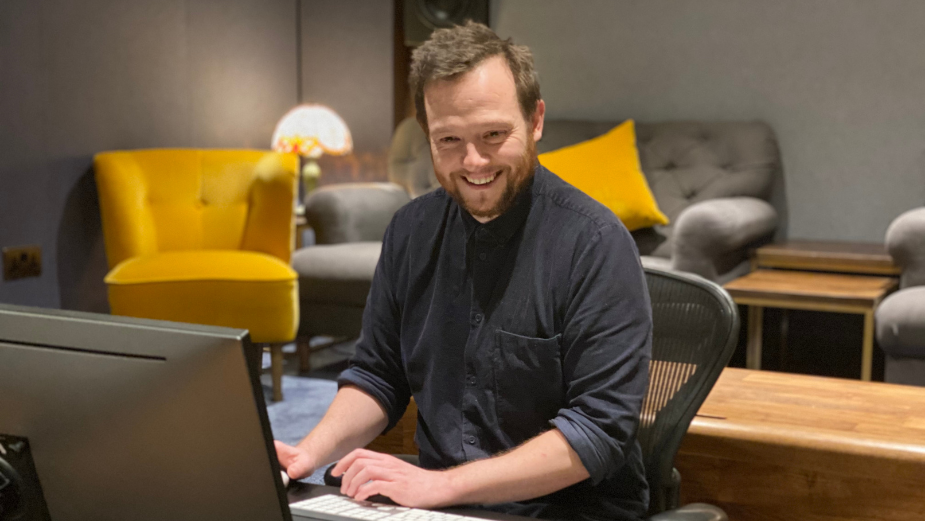
Thinking in Sound: Culum Simpson

Thinking in Sound is a new feature that delves into the minds of the industry’s fantastic music and sound specialists, showing us just how creative this part of the industry is. We dig into inspirations, passions, and approaches to work, whilst also getting a taste of how the industry is changing.
In this interview, we speak to String and Tins sound designer Culum Simpson about his journey from actor to sound designer, his love of silence, and what we can learn from electronic music.
LBB> Where did your interest in sound begin?
Culum Simpson> I actually started out in drama school with the hopes of becoming an actor. The school was near Camden where there was a huge indie music scene at the time with many bands and a huge wealth of small venues that were putting on hundreds of shows a week. So I got involved playing in a few bands and ended up running a rehearsal room for a year. With the profits, I bought myself some recording gear and started working with some of the bands - it was a real time of change for me. I went on to study a short course and then just wandered the streets of Soho with a CV and managed to get a job as a runner! The little bit of experience that I had as an actor seemed to work in my favour too as it comes quite naturally to me when I work with voice overs or directors. There's a vernacular and a language to it.
Culum> I think people like to try and save an actor's feelings by being very broad with what they want. Giving direction like, ‘imagine you’re talking to your mate in the pub’ or ‘more conversational’ are not particularly helpful. You're just trying to save a human's feelings. You'll probably save them more if you tell them exactly how you want them to say it. Tell them if you think they should put an inflection in there and a pause in here. You get there faster that way and then the talent is going to think, ‘great, I've done my job right!’ It’s about giving specific direction because yes, they’re people, but we all need to be comfortable with getting criticised professionally in order to get the best result in the end - and an actor is no different.
LBB> When it comes to your process, how do you like to approach a brief and generate ideas?
Culum> I think there's something to be said for big powerful broad strokes. I enjoy starting a project and thinking okay - what are the major beats, where are the areas we need to convey key emotions, and how do we then craft that journey? Between those big major story beats, you can more easily visualise how the details can fall into place.
For inspiration, I listen to a lot of electronic music. As I've gained more experience in sound, I’ve realised quite how difficult it is to make nice sounding electronic music, even the simplest stuff. I like to try and dissect how some of the electronic artists that I love design their sounds - it's hard to imagine how they could conceive such a thing and I kind of enjoy dissecting that. Then through that process, you can come up with some really cool ideas of your own.
LBB> How else has your relationship with sound and music changed over the years?
Culum> I've gotten more into it! When I started out, I was thinking, shit, well I’m not acting anymore so I need to do something else, and I found success drawing from my past experience in the theater working with VOs. Over time, as the projects I've worked on required more sound design and technical understanding of audio, I’ve come to appreciate it more. Electronic music has played a really big part in that too. It can be orchestral and sweeping. It doesn't just have to be dance music. I think that it can be exceptionally powerful and unique. When someone makes a piece of electronic music, they first need to make the instrument, make the sounds. They can create a new sound that quite literally has never been heard before, the possibilities are pretty vast. In that appreciation, and exploring how it’s made, my love of sonics as a technical pursuit blossomed. I can now safely say I’m pretty nerdy for it.
LBB> So music and sound can be really collaborative and interactive forms of creativity. Do you personally prefer to work solo or in a team?
Culum> I think it depends on the job. I think there are certain scenarios in which it's really handy to have somebody else's perspective. That's an important thing to understand - even if you like something, somebody else may not or somebody else may have a different spin on it which totally changes your view - it’s important to be malleable. I also think there's something to be said for flying solo. Sometimes, too many creative visions can muddy themselves. Sometimes it's really nice to have a straight shoot to the end - and some of the bigger jobs and award winning jobs I've done have been very much like that.
One of the great things about the lockdown for working on sound, is that very quiet, singular concentration. Not necessarily for the entire duration of the project, but sometimes being able to have that focus at the start of a job gets the project on its feet faster.
LBB> As the advertising industry changes, how do you think the role of music and sound is changing with it?
Culum> Everyone has been so obsessed with visual effects for so long, and sound has always been that thing that you only notice if it’s wrong. And I think that's starting to change. Now, I think people are starting to realise its importance of conveying emotion. Sound can have a dramatic impact on how we perceive a scene or how we perceive the mood of a film; be it friendly or scary or tense. As no one is really ‘looking’ out for it, sound can sneak in the back door and take you by surprise. The ticking clock in Nolan’s ‘Dunkirk’ for example - it’s always there, through the whole movie, ticking away, and you only really notice it when it stops. The relief of that was incredible to experience.
LBB> What would you say the most satisfying part of your job is and why?
Culum> I enjoy bringing together different ideas. It’s really satisfying taking a lot of different hopes for a project and making them feel like a coherent whole. It feels ace when everyone who has a creative hand in the job, however different that may be, turns back and thinks ‘yeah I feel like we got it’.
LBB> And in terms of how you collect music and sound? What sort of shape does that take?
Culum> I mean, I have one playlist on Spotify and it's 1000 songs long. I'm not really one for cataloguing. I've just got one playlist that I started on a ski trip a decade ago so I just stick it on shuffle and go. If you’re not into a tune that comes on… skip it. I’d probably be a terrible DJ.
LBB> Wow, wouldn’t expect that from a sound guy! What are some of your favourite memories of sound from your travels?
Culum> I did a tour across America once. I hopped on a plane to Chicago and hired an old motorcycle to drive to Los Angeles. That was quite a solitary experience, and it was wonderful. It was the lack of anything that got me. You get out of Chicago and then there's a big swathe of nothing till you hit Los Angeles. And it was quite lovely to switch off from everything and not have constant noise, like phones and TVs and everything. It was just…nothing. The wind is so pervasive you barely even hear the bike. I think it kind of made me realise how powerful quiet is - like real quiet. Desert quiet. It’s quite spooky and can be exceptionally powerful.
LBB> Do you use that in your work much?
Culum> I do. In fact, there was a moment I remember, where I used pure silence after building from a huge riser then cutting to nothing. The spot was so chaotic leading up to that moment that the switch was really shocking - it definitely turned a few heads! It’s not just cutting to silence though, I think that any dramatic change in energy can be so powerful.
LBB> Lastly, what are you most excited about in the realm of music and sound for this year and in the future?
Culum> As the world has gotten more complex, people's reach needs to be that much shorter to gain knowledge. Everything is so readily available. We can easily access new music, books and podcasts that we wouldn't normally listen to. I think our knowledge is becoming broader and our tastes are becoming more refined as a result. Sound is playing a big role in that, especially with podcasts. And the tech behind it isn’t smoke and mirrors anymore. It's not magic. If you want to create a podcast, you don't have to go to a studio. You do it on your laptop in your kitchen. It’s so easy to get started and that is exciting. It’s that ease that is making people who would never think that sound or media was accessible to them think twice and dive in. This influx of new people is making everybody up their game a little bit, and that’s never a bad thing.













